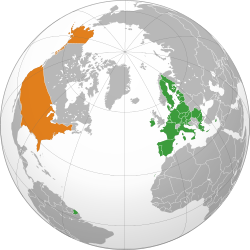Trans-Atlantic Free Trade Agreement

The United States (orange) and the European Union (green)
|
|
| Type | Trade agreement |
|---|---|
| Drafted | TBA |
| Signed | TBA |
| Effective | Not yet in force |
| Condition | Approval by all 28 members of the Council of the European Union and by the majority of members of the European Parliament, and by both houses of the United States Congress |
| Original signatories |
|
| Languages | English, French, and German |
The Transatlantic Trade and Investment Partnership (TTIP) is a proposed trade agreement between the European Union and the United States, with the aim of promoting trade and multilateral economic growth. TTIP is considered a companion agreement to the Trans-Pacific Partnership (TPP). As of January 2017[update], the agreement is under ongoing negotiations. According to Karel de Gucht, European Commissioner for Trade between 2010 and 2014, the TTIP is the largest bilateral trade initiative ever negotiated, not only because it involves the two largest economies in the world but also "because of its potential global reach in setting an example for future partners and agreements". Its main three broad areas are market access, specific regulation, and broader rules and principles and modes of co-operation. The negotiations were planned to be finalized by the end of 2014, but would have not been finished more than five years later, until 2019 or 2020, according to economist Hosuk Lee-Makiyama in 2015.
The reports on the ongoing negotiations and the contents of the negotiated TTIP proposals are classified from the public, and can be accessed only by authorised persons. Multiple leaks of proposed TTIP contents into the public caused controversy.
The European Commission says that the TTIP would boost the EU's economy by €120 billion, the US economy by €90 billion and the rest of the world by €100 billion. According to Anu Bradford, law professor at Columbia Law School, and Thomas J. Bollyky of the Council on Foreign Relations, TTIP aims to "liberalise one-third of global trade" and could create millions of new jobs. A Guardian article by Dean Baker of the US thinktank Center for Economic and Policy Research argued that the economic benefits per household would be relatively small. According to a European Parliament report, mainstream "state of the art" economic analyses show that TTIP would lead to net job gains whereas heterodox analyses show net job losses.
...
Wikipedia
